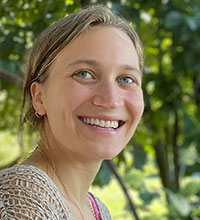

Renata Correa Gomes, Research Coordinator, Stanford University
Allison Gross, Research Coordinator, Stanford University
Early Childhood Education Practices for Emotional Wellbeing: A Study of Rohingya and Venezuelan Refugee CommunitiesBy Renata Correa Gomes and Allison Gross
This presentation presents the findings of a master's dissertation for the International Education Policy Analysis program at Stanford's Graduate School of Education. Research has previously shown that adverse experiences, such as forced displacement, can subject young children to the consequences of trauma and can have lasting negative effects on a child’s development and well-being. The purpose of this study was to investigate how early childhood education workers from two non-governmental organizations operating within refugee camps in Bangladesh and Brazil perceived the causes of emotional challenges children face and how they supported the emotional needs of the children they work with. In-depth interviews were conducted with 10 participants in each case study. Findings point to the importance of understanding the root causes of children’s emotional distress. In addition, the trauma-informed practices education workers used in both scenarios are inextricably linked to cultural nuances in each site—from the ways one identifies when a child is in need, builds trusting and affectionate relationships, acts in a culturally-responsive manner, employs conflict-sensitive education strategies, and engages the community in investing and sharing responsibility towards the child. Based on these findings, we recommend policies surrounding harm reduction, community engagement, the creation of safe spaces for children to play, the deliverance of basic needs, and increased consciousness surrounding the delicate and unique nature of a child’s traumas.

